Razer Leviathan Mini: Quality Sound Minus Frills
Razer’s Leviathan Mini Bluetooth speaker delivers good overall sound, but lacks the ruggedness and extra features of its competitors.
Why you can trust Tom's Guide
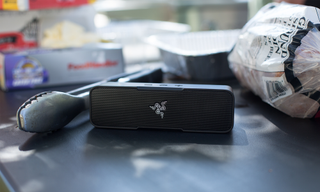
Many Bluetooth speakers try to pack in as many features as possible to entice you to buy. The $180 Razer Leviathan Mini is a return to simpler times; it's a small speaker that plays music and doubles as a speakerphone. If rich bass and crisp treble are all you need, the Leviathan Mini may be the right portable wireless speaker for you. However, you can find better ruggedness and battery life elsewhere.
Design
The Leviathan Mini features the same design aesthetic as Razer's $200 Leviathan soundbar. The all-black speaker is adorned with Razer's logo on the front grill, but there's little other decoration. On top, + and - buttons control the volume, while the circle button plays and pauses music, and answers calls. The right side features buttons for power and Bluetooth pairing, as well as a 3.5mm auxiliary input and a micro USB port for charging. The left side has no buttons, but features an NFC sensor for quick pairing.
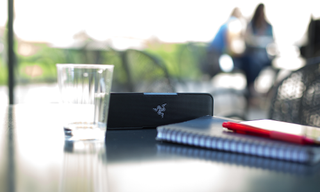
At 7.28 x 2.16 x 2.12 inches, the Mini's footprint is on a par with the 7.1 x 2.6-inch UE Boom 2 and the 7.1 x 2.3 x 2.0-inch Bose Soundlink Mini. At 1.21 pounds, the Mini weighs the same at the Boom 2 and less than the 1.5-pound Soundlink Mini.
The drums on Justin Timberlake's 'Can’t Stop the Feeling' had oomph, while the bass was detailed without getting muddy.
The Leviathan Mini lacks the rugged protection of the Boom 2 — it's not waterproof and it's not designed to withstand drops. With that in mind, it's better suited to the bedroom or the office than a campground.
MORE: Best Bluetooth Speakers for Home or On-the-Go
Performance
The Leviathan Mini produces well-balanced bass and treble for a small speaker. The drums on Justin Timberlake's "Can’t Stop the Feeling" had oomph, while the bass was detailed without getting muddy. The low-end was more pronounced than on the UE Boom 2; but bass lovers will prefer the Bose Soundlink Mini.

The Leviathan Mini also did well with vocals, again bettering the Boom 2, and offering a comparable performance to the Soundlink Mini. Timberlake's voice sounded full and rich, as did Rihanna’s vocals on Kanye West's "Famous."
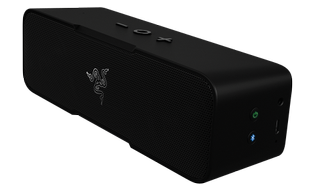
With its two 45mm drivers, the Leviathan Mini produced good separation of instruments and vocals when playing Radiohead's multilayered "The Numbers," and the ultra-distorted guitars on Wilco's "Random Name Generated" were clear in the mix.
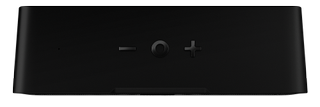
Razer's speaker also handled acoustic music well. The saxophones on Charles Mingus' jazz classic "Goodbye Pork Pie Hat" sounded warm and full.
The Leviathan Mini lacks ruggedness — it's better suited to the bedroom or the office than a campground.
The Leviathan Mini matched the UE Boom 2 in volume. I measured it at a max of 90 decibels. However, it distorts significantly about 85 dbs — same as the Boom 2. The speaker's small size means it's best suited for small to medium rooms.
Pairing and Wireless
The Mini paired easily with iOS and Android devices, and I was able to use NFC to quickly get set up on an Android tablet. The Bluetooth range was average, breaking up after I was about 30 feet from the speaker. By comparison, the UE Boom 2 has a range of 100 feet.
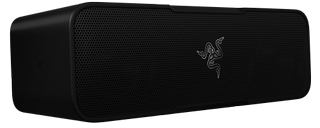
The Leviathan Mini doesn't have any way to adjust the bass, treble or midrange, or a mobile app to tweak settings. You can pair it with another Leviathan Mini for stereo sound — a great way to improve the overall sound quality of small speakers.
Speakerphone
Thanks to its detailed bass, the Leviathan Mini did well projecting the voices of people I spoke with through the speakerphone. People on the other end of the calls said I sounded clear but distant, especially when compared with the iPhone’s built-in speakerphone. It's better than the speakerphone on the Boom 2, which created a muffled sound.
MORE: 10 Things You Didn't Know Spotify Could Do
Battery Life
Razer says the Leviathan Mini can play for about 10 hours without needing a recharge. My testing showed this to be accurate. However, if you leave the power on and your phone or tablet is within Bluetooth range, the speaker doesn't shut off — even if you're not playing anything. I discovered this the hard way: the battery drained completely even though I had listened for only a few hours. When I remembered to turn the power off, it lasted the full 10 hours.
You can pair two Leviathan Minis for stereo sound, which is a great way to improve the overall sound quality.
Even when you preserve the full charge, 10 hours isn't much for a Bluetooth speaker these days. The Boom 2 plays for 15 hours and the Soundlink Mini lasts for 12 hours.
Bottom Line
Razer — best known for gaming hardware — continues its expansion into audio with another solid entry. The Leviathan Mini does the one thing a Bluetooth speaker should strive for first: delivering good overall sound for its size. The no-frills approach may be just what you want. And at $180, the Mini costs a bit less than the competition.
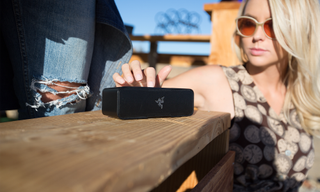
But Razer left out the ruggedness that many portables include, and you may miss those features if you want to take the speaker outside your home or office. While it has better sound than the $200 Boom 2, the Boom 2 is waterproof and can take bumps without a problem. If you're OK without the ruggedness, the $200 Bose Soundlink Mini produces much bigger bass and has slightly better battery life.
Sign up to get the BEST of Tom’s Guide direct to your inbox.
Upgrade your life with a daily dose of the biggest tech news, lifestyle hacks and our curated analysis. Be the first to know about cutting-edge gadgets and the hottest deals.

Michael Gowan is a freelance technology journalist covering soundbars, TVs, and wireless speakers of all kinds of shapes and sizes for Tom’s Guide. He has written hundreds of product reviews, focusing on sound quality and value to help shoppers make informed buying decisions. Micheal has written about music and consumer technology for more than 25 years. His work has appeared in publications including CNN, Wired, Men’s Journal, PC World and Macworld. When Michael’s not reviewing speakers, he’s probably listening to one anyway.
